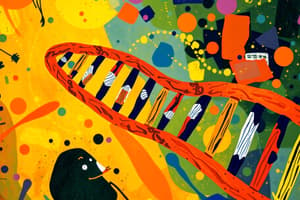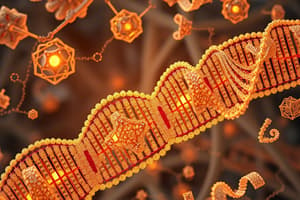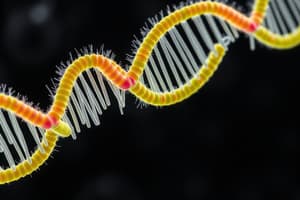Podcast
Questions and Answers
In eukaryotic cells, transcription cannot begin until:
In eukaryotic cells, transcription cannot begin until:
- Several transcription factors have bound to the promoter. (correct)
- The two DNA strands have completely separated and exposed the promoter.
- DNA nucleases have isolated the transcription unit.
- The DNA introns are removed from the template.
- The 5' caps are removed from the mRNA.
Which of the following is not true of a codon?
Which of the following is not true of a codon?
- It is the basic unit of the genetic code.
- It consists of three nucleotides.
- It never codes for more than one amino acid.
- It may code for the same amino acid as another codon.
- It extends from one end of a tRNA molecule. (correct)
The anticodon of a particular tRNA molecule is:
The anticodon of a particular tRNA molecule is:
- The part of tRNA that bonds to a specific amino acid.
- Changeable, depending on the amino acid that attaches to the tRNA.
- Complementary to the corresponding triplet in rRNA.
- Complementary to the corresponding mRNA codon. (correct)
- Catalytic, making the tRNA a ribozyme.
Which of the following is not true of RNA processing?
Which of the following is not true of RNA processing?
Which component is not directly involved in translation?
Which component is not directly involved in translation?
Which of the following mutations would be most likely to have a harmful effect on an organism?
Which of the following mutations would be most likely to have a harmful effect on an organism?
Flashcards
Transcription Initiation in Eukaryotes
Transcription Initiation in Eukaryotes
Transcription in eukaryotic cells requires specific proteins called transcription factors to bind to a region upstream of the gene called the promoter.
What is a Codon?
What is a Codon?
A codon is a three-nucleotide sequence on mRNA that codes for a specific amino acid.
Anticodon Role
Anticodon Role
The anticodon on tRNA is a three-nucleotide sequence that is complementary to the corresponding codon on mRNA.
RNA Processing
RNA Processing
Signup and view all the flashcards
What is NOT Directly Involved in Translation?
What is NOT Directly Involved in Translation?
Signup and view all the flashcards
Harmful Mutation
Harmful Mutation
Signup and view all the flashcards
Study Notes
Transcription in Eukaryotic Cells
- Transcription initiation requires several transcription factors to bind to the promoter before RNA polymerase can attach and start transcribing DNA.
Codons
- Codons consist of three nucleotides and are fundamental units of the genetic code, determining specific amino acids during protein synthesis.
- Multiple codons can code for the same amino acid, highlighting the redundancy in the genetic code.
- A codon does not extend from the tRNA molecule, which carries the anticodon.
tRNA and Anticodons
- The anticodon of tRNA is complementary to the corresponding mRNA codon, ensuring accurate translation of the genetic code.
- This complementary pairing is crucial for the correct incorporation of amino acids during protein synthesis.
RNA Processing
- In RNA processing, exons are not cut out; instead, introns are removed while exons are spliced together to form mature mRNA.
- Nucleotide modifications, such as the addition of a 5' cap and poly-A tail, occur at both ends of the RNA molecule.
- Ribozymes and spliceosomes play critical roles in facilitating RNA splicing.
Components of Translation
- Translation involves mRNA, tRNA, ribosomes, and GTP, whereas DNA is not directly involved in the translation process.
Effects of Mutations
- A single nucleotide insertion near the start of the coding sequence is most likely to have harmful effects due to potential frameshift mutations that alter the reading frame, affecting protein synthesis.
- Other mutations like nucleotide substitutions and deletions may not have as severe consequences, especially if they occur in non-coding regions or have no impact on the protein function.
Studying That Suits You
Use AI to generate personalized quizzes and flashcards to suit your learning preferences.




